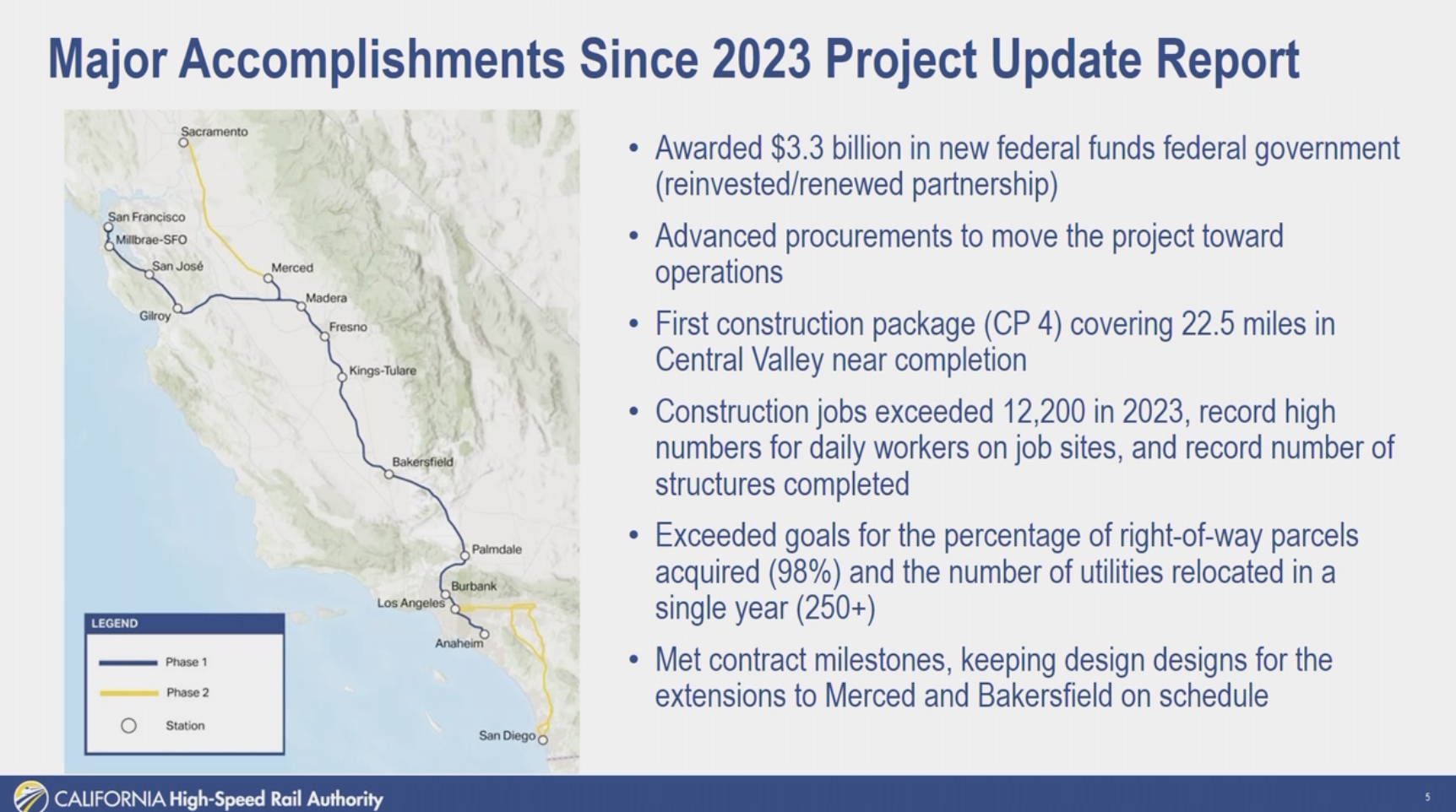The legislature this week held two oversight hearings to discuss the CA High Speed Rail 2024 Business Plan. Both the Assembly Transportation Committees and the Senate Transportation Committees held sessions to quiz CAHSRA staff on progress made, plans for the coming year, and the future shape of the program.
Also appearing at both hearings were representatives from the Legislative Analyst Office, the Peer Review Group that was created under Prop 1A, and the new Inspector General, an office created to give the state more oversight over the project.
Progress to Now
The short version of the 2024 Business Plan is that the goal remains to complete an initial operating segment of electrified high-speed rail in the Central Valley between 2030 and 2033.
The program is making progress on construction of the initial operating segment, which will extend from Merced to Bakersfield, and has completed almost all of its environmental clearances - the exceptions being the segment from Palmdale to Burbank, which is expected to be completed in June of this year, and the final segment to Anaheim, which is a year out.
With the recent allocation of $3.3 billion from the federal government, ongoing funding from the state's cap-and-trade system that will bring between $27 and $30 billion between now and 2030, and a plan to secure more federal funding, CAHSRA would still face a gap of several billion dollars to complete the initial segment. The Legislative Analyst Office brought this up numerous times, and Lou Thompson of the Peer Review Group, as he has every year at these annual hearings, pushed the state to make a commitment one way or the other on the project. "If we want to do this, then we have to ask: how do we find the funding, so they can have a responsible funding plan," he said.
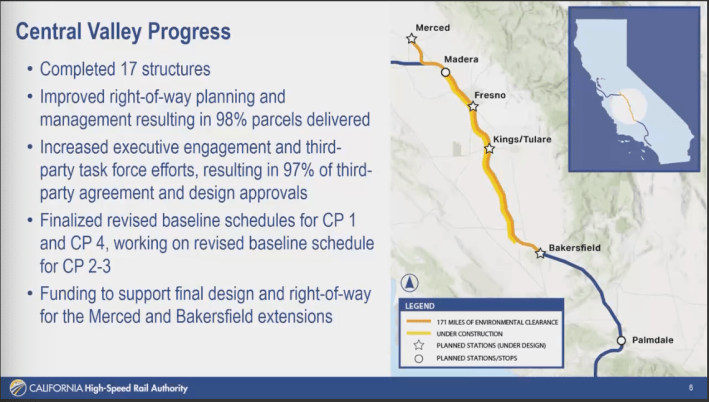
Lessons Learned
Senator Josh Newman asked CAHSRA head Brian Kelly - who plans to step down as CEO as soon as a replacement for him is found - what lessons he had learned during his time at CAHSRA that would be useful to keep in mind going forward.
"We've had to learn [some things] the hard way," said Kelly, describing "a very difficult beginning" to the program, which had some money from Prop 1A but nowhere near what it would take to build the project, and it was attached to unrealistic expectations. When the project did finally get some federal money - about $3 billion in 2010 - it came with a very tight deadline to produce something ASAP. In response, the Authority "went into construction right away, without securing all of the right of way, without moving the utilities - and that meant delays, as they uncovered problems. Delays bring added costs," said Kelly.
But, he said, that is history, and the process is different now. "When we got into construction, less than fifteen percent was even designed," he said. "We're not doing that any more - we are not going into construction until the segment is at 100 percent design." He pointed out that it was a lesson that the federal government also learned the hard way, as projects in other states that did not meet deadlines had to repay grants. California did not have to.
"Another lesson, which Lou Thompson [of the Peer Review Group] has said consistently, is that it is extremely difficult to manage a project where there are expectations for timely delivery, but it is not funded," he said. "If the policy of California is to advance passenger rail into something that is clean, fast, and brings clean mobility benefits to residents, then we have to address the instability of funding."
But that doesn't mean trying to fund the entire project in one go.
"The entire system will cost on the order of $125 billion, to get it all done," he said. "We have about $28 billion in hand. It would be great if you could fund it all right now, but I don't recommend that. First, we've got to get value out of where we have started construction. Getting into the Central Valley cities was key. To do all that we want to do - and I do think there is a want to get passenger rail moving from diesel to electrified, fast systems - that is going to take a federal partner." He compared the construction of HSR to the interstate highway system, which was built "with a trust fund system and federal partners…. That is a key conversation, about how any state will do this. And I think what we can do is prepare ourselves for that."
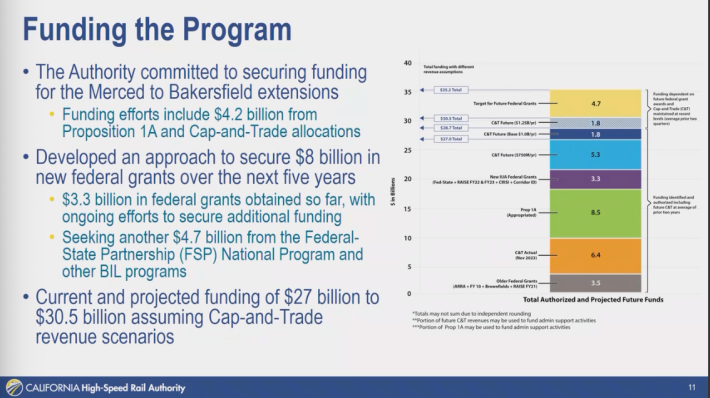
"It's been tough to plan a project where the only source of regular funding has an expiration date; we have to plan beyond that. So what we're doing is building it in blocks - getting the Valley section done, and preparing the bookends."
Questions
One committee member who raised questions was Senator Roger Niello (R-Rancho Cordova). Saying, "I am a certified public accountant," he tried to poke a hole in the business plan's definition of operating subsidies. Prop 1A ruled out using state subsidies to operate the system, he said, and if the Authority didn't amortize the capital costs into its operating costs, that was "a clear violation of Prop 1A," in his book.
Kelly and Thompson both pointed out that no transit system in the world - with the possible exception of Japan - includes repayment of its capital costs in its operating costs.
Another member asking questions was Senator Kelly Seyarto (R-Murrieta), who reiterated his opposition to the program, and claimed he knew nobody who supported it. Then he said, "This one project is sucking most of the transportation dollar opportunities for everything else…. I come from a district that will not benefit from this whatsoever - and what we are not benefiting from is transportation dollars for roads!"
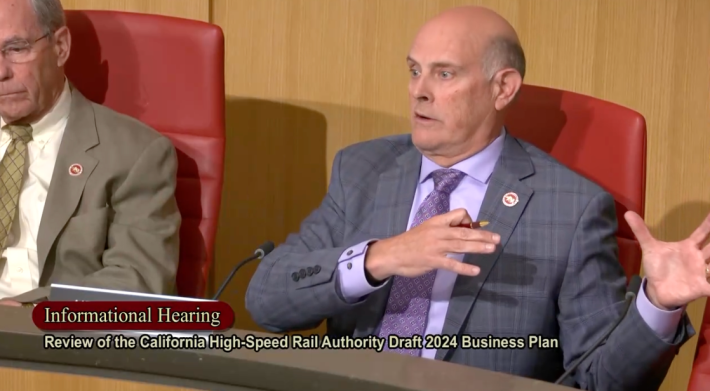
That may have been the wrong thing to say to Kelly, who has previously served as head of both Caltrans and CalSTA, the state transportation agency. "I was secretary of the agency when we passed S.B. 1, the largest transportation funding pot ever," he said. "And this project did not get a penny of S.B. 1."
"There's another consideration," he continued. "I don't think it's sustainable in the era of climate change to just build roads. Projects have to improve mobility in a way that roads don't. [Transportation] has to be clean - it can't produce emissions. It has to be accessible. It has to produce great economic benefits. In all my years at the state, I've never seen one project that touches all those buttons like this one does."
"When you're stuck in the middle of a very tough project, it seems impossible - until it's not," he added.
Seyarto has been distinguishing himself as being particularly uninformed about some of the issues he is helping make decisions about, but he represents a swath of California residents who share his views. Even though the LA Times's anti-high-speed-rail troll Ralph Vartabedian is gone, his years of undermining support for the program live on in people like Seyarto.
What the high-speed rail program needs is a strong - and loud - champion who can continue Kelly's work, keep the project moving forward, and build enough support for it that the funding becomes a matter of when, and not if, it will appear.
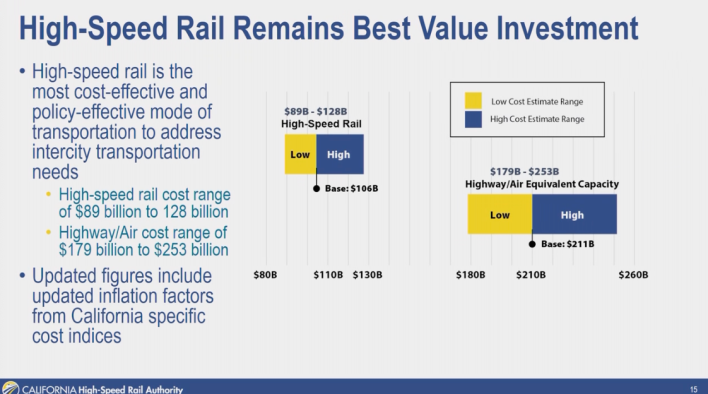
CAHSRA will hold a meeting about selecting a new CEO on March 22.
